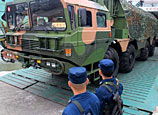
VANCOUVER, Jan. 31 (Xinhua) -- The participation of China is critical to the development of Canada's Northwest Territories (NWT) to realize the benefits of a "very exciting period in the north", said the region's Premier Bob McLeod on Thursday.
"There is a large potential for development. We see ourselves as a powerhouse in Canada's economy. We are promoting partnerships, " McLeod said during a conference call with the media.
In the vast northern territory covering more than 1.18 million square kilometers, a place that is home to only 41,462 people, based on the 2011 Canadian census, McLeod cited the potential for fur, gold, diamonds, minerals, rare earth, natural gas and petroleum for cooperation.
Earlier this week in a Conference Board of Canada report, the think-tank forecast that mining output in the NWT would rise from 732 million Canadian dollar (732.1 million U.S. dollars) to 1.3 billion U.S. dollars in 2020.
"On oil and gas, I'm convinced that we need to find alternative markets to the United States and we need to find a way to get our oil and gas to China. They have significant demand that's increasing by leaps and bounds every year," said McLeod, who visited China last September as part of a Canadian business delegation.
"(It's the) Same with mining. They're very interested. They want to invest. They know the rich resources we have," he added. With some from the territorial government currently in Ottawa for meetings with the ruling Conservative government, what the NWT officials are seeking is "devolution".
While such an agreement wouldn't give the territory provincial status, what it would provide the NWT with is control over its land, natural resources and water.
McLeod said an agreement was expected in the near future. "What that means is northerners will take more responsibility for making decisions on those things that effect us. We will take over responsibility for oil and gas, mining and managing the land in the Northwest Territories, and of course, we will collect the royalties and we will have more resource revenues to invest in our programs and our infrastructure for the people of the Northwest Territories," he said.
"Also with our aboriginal government partners, we will be the first jurisdiction in Canada that will provide for resource- revenue sharing with aboriginal governments," said McLeod.
With the NWT in need of improved infrastructure such as highways, housing and fiber optic links, the Premier said the devolution deal is an important part of the equation for future development. Tourism will also play a big part in the territory's growth.
Since 2010, Canada has had Approved Destination Status from China and the country has quickly become one of the top choices for Chinese tourists.
According to NWT figures, Chinese tourists added 1.5 million dollars to the territory's economy in 2011. But McLeod noted that the market was only in its infancy. "Our research and the Canadian Tourism Commission research indicates that Canada is the most favored destination now, so there's a lot of Chinese that want to visit (NWT)," McLeod said.
"There's about 30 million people in their middle class that travel and there's an indication about 100,000 are interested in coming to the north, so we want to get all of them to come visit," McLeod noted.


















![]()
